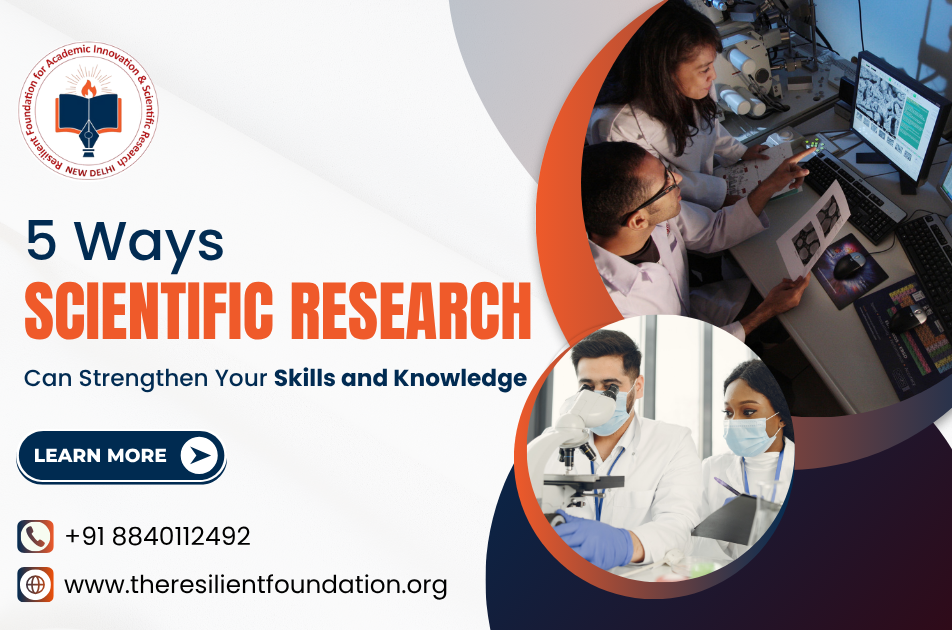Learning new things is important today, but reading books or listening to teachers is not enough. We need better ways to grow. One of the best ways is through scientific research. It helps us think, solve real problems, and understand topics better. Research teaches us how to ask questions, find answers, and learn with proof. If you want to improve your skills, scientific research is a smart way to do it.
At Resilient Foundation, we offer online workshops and training programs that are based on research and development. These programs help people learn faster and grow stronger. If you want to become better in your studies, work, or personal life, research can help you move ahead.
Scientific Research Enhances Critical Thinking and Problem-Solving
Doing scientific research makes your brain stronger. You learn to think carefully and solve problems step by step. These skills are useful in every part of life.

- Ask better questions: You don’t just accept things as they are. You ask “why,” “how,” and “what if” to understand better.
- Look for the truth: Research, therefore, teaches you to look for facts; consequently, it encourages you not to believe everything you hear.
- Find good answers: You learn how to find real solutions to problems that matter; consequently, you develop critical thinking skills that enhance your decision-making abilities.
- Think clearly: Your mind becomes sharp, and you can understand things more deeply.
- Avoid mistakes: You don’t guess; instead, you check and test before deciding.
Because of that, our online workshops at Resilient Foundation help you build strong thinking skills with fun and useful activities.
Promoting Collaboration and Communication Skills
Many people think scientific research is done alone, but that’s not true. Most research happens in teams. It helps you talk better and work well with others.
- Work in teams: Research projects often have many people working together. You learn how to share and help each other.
- Explain clearly: You must talk and write about what you find. So, you become better at explaining your ideas.
- Listen to others: You also learn to listen carefully and respect others’ opinions.
- Write better: Research teaches you to write clearly so others can understand your work.
- Accept new ideas: You meet people who think differently, and you learn from them.
That’s why our training programs include teamwork, group tasks, and communication exercises to help you improve these skills.
Builds Research and Analytical Abilities
When you do scientific research, you learn how to collect, study, and understand information. These are called analytical skills, and they are helpful in every career:

- Read data: You learn how to study charts, graphs, and reports. This helps you see what’s happening.
- See patterns: You notice things that repeat or connect; consequently, this helps you understand big ideas.
- Test ideas: You don’t just believe in things; rather, you check them to see if they are true.
- Use tools: You learn how to use software and tools that, in turn, help you with research.
- Decide smartly: After all this, consequently, you can make better choices based on facts.
Our research and development programs at Resilient Foundation teach these skills through real-life tasks and hands-on learning.
Strengthens Subject Matter Expertise
If you want to become good at a subject, scientific research is the best way to learn more. It helps you know your topic deeply and with confidence.
- Learn deeply: You go beyond the basics; furthermore, you understand every part of your topic.
- Stay updated: Furthermore, research helps you keep up with new information and, in addition, changes.
- Remember more: Because you’re working on it, you consequently remember things better and, as a result, longer.
- Speak with confidence: When you know your subject well, therefore, you feel sure when talking about it.
- Use in real life: You also learn how to use your knowledge in real situations; furthermore, this application enhances your understanding and skills.
Our online workshops are designed to give you this deep learning through fun and focused lessons.
Encourages Independent Learning and Curiosity
One of the best things about scientific research is that it makes you more curious and helps you enjoy learning independently. This habit is very useful in life.
- Ask more questions: You start wondering about things; consequently, you want to learn more.
- Try new topics: You feel excited, and you are eager to explore new ideas and subjects.
- Learn by yourself: You don’t always need a teacher. You learn how to study and grow on your own.
- Grow stronger: You don’t give up when something is hard; instead, you try again and, in doing so, learn from your mistakes.
Our training programs are built to help you grow your curiosity, using real scientific innovation and fun learning tools.
Conclusion
At the Resilient Foundation, we know that scientific research helps people grow. It gives you strong thinking, clear understanding, and better skills. It also helps you feel confident, make better choices, and enjoy learning.
That’s why we created online workshops and training programs based on research. They help you learn better, think deeply, and apply real skills. With research methodology and scientific innovation, each session includes fun, useful tasks. If you want to grow smarter and stronger, join the Resilient Foundation today.

